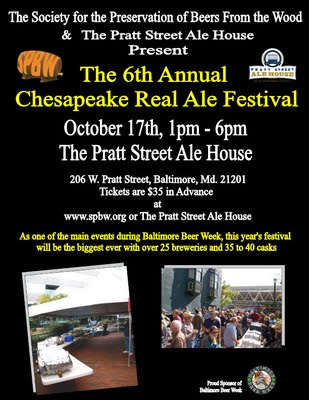What the firkin* is the SPBW?
Here, from the SPBW's website:
It all began on the evening of Friday, 6th December, 1963 when seven disgruntled beer drinkers gathered in the Rising Sun in Epsom [in Surrey, in southeast England]. Their concern was the growing decline in both quality and palatability of beer. This they felt was due to the increasing use of gas pressure dispense and the introduction of keg beers. They deplored the policies of the big brewers who, by forcing the sale of beer from 'sealed dustbins' were threatening the availability of traditional draught beer. The seven drinkers decided to form a society with the purpose of drawing attention to their plight - and so the SPBW [Society for the Preservation of Beer from the Wood] was born.
THAT NAME
In 1963 wooden casks were still regarded as being synonymous with traditional draught beer in contrast to the sealed dustbins which contained the processed and artificially carbonated product. For this reason the name seemed ideal.
After a few years, realising that metal casks were rapidly replacing wooden ones, the Society decided to relax its principles accordingly. Nowadays only about a dozen breweries use wooden casks at all, and the SPBW is more concerned with the contents than the container, which we accept makes little or no difference to the taste of the beer. However, the original name has been retained for the sake of tradition.
The SPBW has been eclipsed, in membership and public advocacy, by the Campaign for Real Ale (CAMRA), which, among other activities, sponsors an annual showcase of cask ales called the Great British Beer Festival.
The only SPBW branch in the US —based in Baltimore, Maryland— is very active. Every autumn for the past 5 years, the SPBW/Maryland has produced the Chesapeake Real Ale Festival, a celebration of cask ale from breweries in the mid-Atlantic region. This year the festival has been timed to be part of the inaugural Baltimore Beer Week, falling on Saturday, 17 October. From an email announcement:
The 6th Annual Chesapeake Real Ale Festival
The TIME: Saturday, October 17th, 2009, 1 PM - 6 PM
The VENUE: Pratt Street Alehouse (formerly Wharf Rat Camden Yards), 206 W. Pratt St, Baltimore, Maryland.
THE PRICE: $35 which will include a souvenir SPBW/PSA mug to go along with unlimited samples of over 35 cask conditioned beers, some rare, some not so rare, all delicious though! Plus tons of giveaways and food available a la carte.
THE BEERS: We expect to have 35 firkins from 30ish brewers. See the web page for a full list. Right now we have:
- Appalachian
- Barley & Hops
- Brewers Alley
- Brewers Art
- Clipper City
- District Chophouse
- Dog Pub
- Dogfish
- DuClaw
- Evolution,
- Flying Dog
- Franklins
- Lancaster
- Magic Hat
- Pratt St Alehouse
- Red Brick Station
- Rock Bottom Bethesda
- Troegs
Growler fill-ups will be available but ONLY at the end at 6 PM for a nominal price.
Tickets for the Sixth Annual Chesapeake Real Ale Festival are available online . You can also purchase these tickets in person at the Pratt Street Alehouse.
PS - VOLUNTEERS NEEDED - Email alan@spbw.org. We need Friday Setup, Saturday Breakdown, 3 shifts of pourers and someone at the Front and Merchandise booths.

If past history is a guide, there will be more casks than publicized, and cider as well.
What is Cask-Conditioned Ale? It's FRESH Beer.
A cask ale (and sometimes lager) is not aged beer, such as wine or whisky might be. It really is the opposite: as fresh as beer can be. Many craft beer lovers in the US are so anxious to have the newest beer from somewhere else, something new, that they forget that beer is a delicate beverage, much more so thaqn wine. The very act of brewing —all that heat and mixing and pumping— entraps oxygen into the mash and fermenting beer. As the beer ages, all that bound-up oxygen reacts with compounds to form staling aldehydes, especially the classic trans-2-nonenal that gives old beer a cardboard flavor.
Given all that, the fresher a beer is, the better the beer will taste. Define 'better' as as the brewer intended. Define 'better' as as the beer tastes at the brewery before it's packaged into bottles and kegs, a process which further introduces oxygen into the beer.
The freshest a beer will be is at the brewery just out of the fermenter or conditioning tank or ... out of a cask, in which the beer is still fermenting, as if that 10.8 gallon cask were itself a small fermenter.
Thus it's a mystery to me that such a basic fact of beer —that beer has a short lifespan— is not better appreciated by 'craft' beer lovers. Just because a beer is fresh does not make that beer a 'good' beer, but a good beer when fresh is ineffably better than the same beer kegged or bottled, and sent miles away. Heck, many 'craft' beer fans go ga-ga over nitrogenated beer, an artificial process originally developed by Guinness to imitate cask beer.
The hallmark of cask-conditioned beer is its ur-freshness. You'll have the opportunity to taste that 'freshness' at the Chesapeake Real Ale Festival.
- Prior to 2003, SPBW/Maryland partnered for 8 years with Racer's Cafe in Parkville, Maryland (just north of Baltimore) for a smaller festival called the Real Ale Challenge.
- * A firkin is a cask, sized at 10.8 US gallons. More here.
- A story (and photos) on the 2008 Real Ale Festival here.
- Ron Kodlick: A departed partisan of cask ale in Baltimore.








No comments:
Post a Comment
Comment here ...